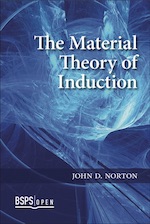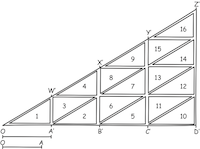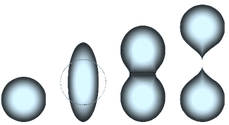
home >> lectures >> Mangoletsi-Potts Lectures


Lecture website at University of Leeds
Accounts of inductive inference are modeled on those of deductive inference. They seek to separate the good inductive inferences from the bad by checking whether some candidate inference conforms to a universally applicable schema or template. This approach has worked well enough for deductive inference and has delivered a sizable collection of uncontroversial deductive logics. The approach has failed for inductive inference. Millennia after inductive inference was first explored systemically in Ancient Greece, we still have no general agreement on which are the good inductive inferences.
The material theory of inductive inference offers an alternative approach. Instead of looking to universal formal templates to warrant inductive inferences, it locates that warrant in facts. Efforts to check whether an inductive inference is good terminate in the display of background facts whose meaning warrants the inference. There are no universally applicable warranting facts for inductive inferences. There is, for example, no factual principle of uniformity of nature. Instead warranting facts are specific facts in the various domains of application of inductive inference. If follows that, in so far as we can find schema for inductive inference, they have local applicability only. "All induction is local."
These lectures will present the material theory of induction as it has been developed in my monograph:
The Material
Theory of Induction
download
open access
from BSPS|open

The Lectures

Lecture 1. The Material Theory of Induction, Introduced
Monday, June 27, 2022
15:30-17:00
Liberty Building LT (LG.06)

Download Powerpoint
A general argument for the material theory of induction is given: since inductive inferences amplify the factual content of their premises, they can only succeed in domains hospitable to them. That the domain is hospitable is a fact about the domain that warrants the inference. The approach will be motivated by considering an inductive inference made by Marie Curie on the crystalline form of radium chloride; and by a second less obvious inductive inference.
Reading

The Material Theory
of Induction
Ch. 1 The Material Theory of Induction Stated and Illustrated
Ch. 2 What Powers Induction Inference?

Lecture 2. Analogy, Abduction and Simplicity
Tuesday, June 28
10–11.30 am
Liberty Building LT (LG.06)

Download Powerpoint
The material theory of induction is capable of recovering the successes of various competing accounts of inductive inference while avoiding their weaknesses. This recovery is illustrated in the cases of inductive arguments based on analogy, abduction and simplicity. Attempts at formal accounts of each have failed to provide us with serviceable templates for each that can be applied mechanically. The apparent successes of these forms of inductive inference are shown to derive from specific background facts peculiar to their domains of application.
Reading

The Material Theory
of Induction
Ch. 4 Analogy
Ch. 6 Simplicity as a Surrogate.
Ch. 8. Inference to the Best Explanation: The General Account
Ch. 9. Inference to the Best Explanation: Examples

Lecture 3. Why Not Bayes
Tuesday, June 28
3.30–5.00
Liberty Building LT (LG.06)

Download Powerpoint
In domains where it is warranted, Bayesian analysis is powerful and effective. However Bayesian analysis, like all formal approaches to inductive inference, cannot be applied in all domains. Whether it is applicable cannot be presumed as a default. Rather we have a positive obligation to show that Bayesian analysis is applicable in each new domain. Symmetry considerations preclude Bayesian analysis from domains in which evidence is completely neutral and when applied to an idealized infinite lottery machine. Arguments purporting to show the universal applicability of Bayesian analysis are circular. For they are deductive. That is, they must proceed from assumptions that must be logically at least as strong as the conclusion sought.
Reading

The Material Theory
of Induction
Ch. 10 Why Not Bayes
Ch. 11 Circularity in the Scoring Rule Vindication of Probabilities
Ch. 13 Infinite Lottery Machines

Lecture 4. There is No Complete Calculus of Inductive Inference
Wednesday, June 29
10–11.30am
Mechanical Engineering LT B (2.37)

Download Powerpoint
A complete calculus of inductive inference captures the totality of facts about inductive support within some domain of propositions as relations or theorems within the calculus. A Bayesian probability calculus fails to be complete in this sense. Its prior probabilities must be stipulated or grounded in considerations outside the domain to which the probabilistic analysis will be applied. One might hope that some other calculus is complete. It turns out, however, that under general suppositions, all other calculi will fail in the same way. This lecture will outline informally the demonstration that there can be no complete, non-trivial calculus of inductive inference.
Reading

The Material Theory
of Induction
Ch. 12 No Place to Stand: The Incompleteness of All Calculi of Inductive
Inference
John D. Norton, collected papers on the Material theory of induction